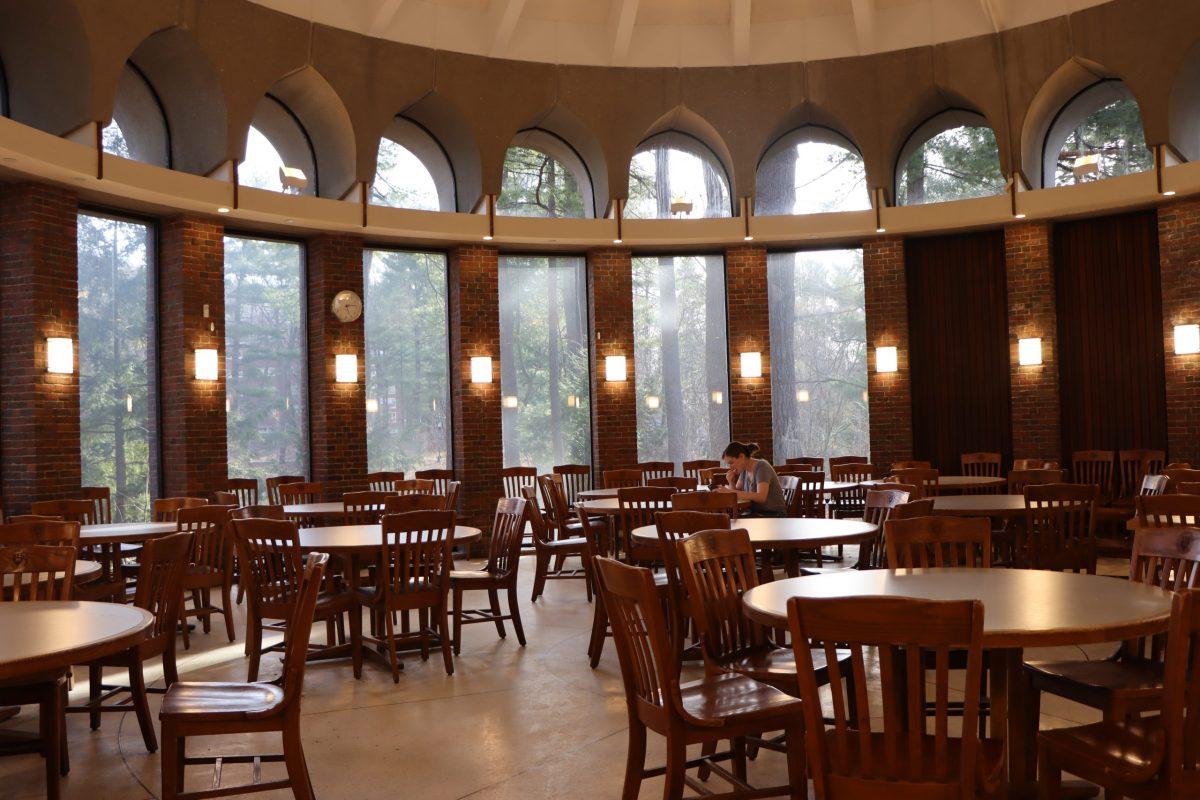Gabriela Leovan ’23, a moderator of the Wellesley FAQ Facebook group, got sick on Feb. 8 after eating dinner at Lulu Campus Center’s Bae Pao Lu Chow dining hall. After seeing multiple students post on the Wellesley FAQ group about them getting food poisoning from other dining halls, Leovan realized her case was not unique.
“I saw people posting about this, and people having questions and I thought it was really helpful to keep people talking about this,” she said. “I just got really concerned once I saw how many people were starting to participate in this discussion.”
Leovan was not the only Wellesley student concerned by the amount of people who were sick from food from the Wellesley dining halls. Sophie Lemmerman ’22 felt as if every other person got food poisoning.
“I have been at Wellesley for four years now, and I’ve never seen anything like this,” she said. “[For me], it hasn’t been anything bad. I haven’t thrown up or anything, but it’s definitely food poisoning because an hour or so after I eat, I will just feel awful, and my stomach [will be] cramping and hurting for the next day.”
Students attempted to organize to call on the Wellesley administration to take action regarding the food poisonings. Leovan met with Julie Jordan, the director of Wellesley Fresh, to voice some of her concerns, but did not see the results she wanted.
“It seems to be a lot of making you feel heard, [but] then I fail to see the follow up action,” she said. “I know there’s a research component to this, [and] a data collection component, but this shouldn’t fall on students. It shouldn’t be us collecting all the data and presenting it to them.”
Leovan’s experience with inaction from the administration, specifically regarding Wellesley Fresh, is one that is reflected in Victoria Cottrell’s ’22 experience as well. Cottrell was diagnosed with celiac disease during her senior year of high school and chose Wellesley specifically because Wellesley Fresh was advertised as being conscious and inclusive of those with dietary restrictions like hers. However, when she came to Wellesley, she found that her needs were not met.
“I very quickly learned that there aren’t as many options as Wellesley Fresh claimed for students who need to eat gluten free,” she said. “There weren’t as many options, for one thing, and the gluten-sensitive room was never fully stocked. Even though they tend to make claims of there being little cross-contamination in the dining halls and that they try to limit it as much as possible, they don’t really [actually do it].”
For Cottrell and others with severe allergies and dietary restrictions, even the slightest cross-contamination can result in severe illness. Cottrell did not blame the dining hall workers themselves but believed it was the responsibility of management to ensure that workers were educated about the dietary restrictions they had to accommodate. She struggled also because items would often be mislabeled, in the Clarity stations and in the gluten-sensitive room as well.
“[It got] to the point where there has been food with gluten placed in the gluten-sensitive room, because they had not checked whether it was gluten free,” she said. “It becomes kind of a nightmare, where you’re kind of just playing Russian roulette with your gut. You can’t trust any of the food that’s being put into your mouth.”
Once the pandemic began, dining hall options were even more limited. The Bates gluten-sensitive room was closed until Nov. 16, 2020, and there was no Clarity station in Lulu until Dec. 6. Both of these provisions were only placed in dining halls after Cottrell appealed to the administration. Eventually, Cottrell was given the option to get off the meal plan, and she took it simply because of her exhaustion from having to advocate for herself for so long.
“At this point, I was kind of done with Wellesley Fresh. It’s just very, very tiring to have to be your own self’s advocate all the time,” she said. “You’re always questioning the safety of the food you’ve been given. I didn’t want to be paying thousands of dollars to be receiving very meager options in comparison to others. [Getting off the meal plan] was not something I wanted to do, but I am very glad I did.”
While Cottrell understands the frustration students are having with the dining halls right now, she was disappointed in how quickly students organized to advocate for better food for themselves, when students with celiac disease and severe allergies had been struggling for so long.
“When I hear about things like food poisoning from other students, and the swift reaction that that’s getting from College Government and the administration, it makes me kind of disappointed because a lot of students with very, very severe things [suffer from reactions] that are not just a day of feeling sick, [but] have long-term repercussions,” she said. “It disappoints me because there should have been a lot more of a reaction from the administration, when students have come forward in the past saying that they’ve gone hungry.”
Leovan also agreed that students should have been more aware of others who were not being listened to by the administration.
“I think we’re actually seeing the natural extension of that because we didn’t advocate for them enough ourselves,” she said. “And now we’re seeing that these problems are extending. They’re now our problems too, and we failed to stop it [then].”
While neither the administration nor students have been able to identify a specific cause of the food poisoning, students reported instances of coming across limited supply options as well as bad produce. Christina Kurre ’23 had also gotten food poisoning early in February, but was not severely ill, although she knew of several friends who had been. Kurre came across an atypical problem when trying to get breakfast from Bates on Feb. 28: the dining hall had completely run out of milk.
“I talked to [the dining hall workers] and they were completely out of milk. I was like ‘Oh my gosh, how can you be out of milk?’” she said. “I mean, that’s just such a basic thing to have in a kitchen. Apparently that day they also had to use frozen eggs to make breakfast. They just made it seem like they just had nothing.”
Lemmerman also noted that the food poisoning may have been caused by bad produce, noting that she had seen rotten cucumbers in Lulu on Feb. 21.
“The cucumbers were literally rotten in Lulu,” she said. “They were brown and gooey and they smelled bad, so I didn’t eat them, obviously. I was pretty disgusted, [since] that’s probably the most explicitly bad the food has ever been.”
Jordan spoke about changes to the dining halls to Senate on March 7, and said that there had been supply chain issues for some time now. She also emphasized in a statement to The News on Feb. 28 that food safety is a top priority for the dining hall.
“We take food and physical safety very seriously and have extensive safety policies and procedures in place to ensure our dining facilities are impeccably maintained, exceed health department standards and meet our own advanced safety standards,” she wrote. “If a student is feeling ill, gastrointestinal or otherwise, they should seek immediate medical attention by contacting health services for diagnosis and treatment.”
However, when asked about the problems with mislabeled items in the dining hall, Jordan responded that the information online is not always consistent with what is actually available. She also noted that sometimes items that are mislabeled are more likely not to have the allergen, rather than the actual allergens themselves not being labeled. Cottrell was disappointed with how Jordan approached this issue.
“Jordan mentions that the allergen information online might not be accurate. The problem with that is that students with allergies won’t be able to know in advance what dining halls have options for them,” she said. “She also notes that allergen mistakes are usually ones that the dish does not include, but that just seems like she’s trying to brush off inaccurate labeling altogether. … The options she listed for students with allergies and celiac are all lacking in nutritious options and students have told them this multiple times. The Clarity station is only open for lunch and dinner; the Bates GS Room does not even consistently have hot meals in it. Even those options are not entirely safe, especially for those of us with a lot of sensitivity to allergens.”
While each interviewee noted that the food poisonings and general problems in the dining halls necessitated action from the Wellesley administration, they did not express much optimism about any action being taken.
Kurre expressed her low expectations from the administration as well, noting that any changes will likely not be implemented for some time.
“I don’t think in any of our time at Wellesley, even [for] the first years, I don’t think we’ll see a change,” she said. “It’s possible that they’ll change it gradually, but I think this is such a continual issue that [it is] not going to change quick enough for [us to see] the benefits. Maybe some of us won’t get food poisoning next year.”






